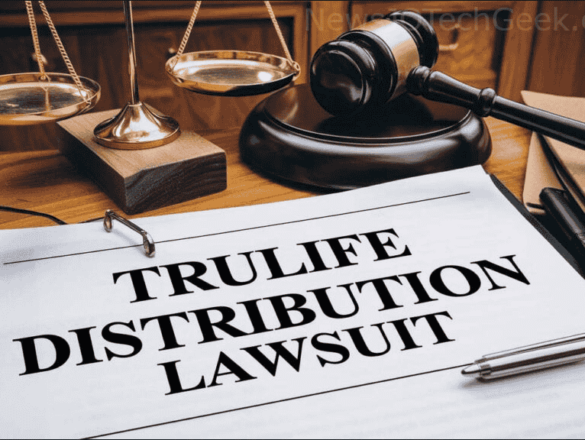Introduction
The Trulife Distribution lawsuit presents a significant case within the health products industry, stirring discussions around regulatory compliance, business ethics, and corporate responsibility.
As Trulife Distribution faces allegations that could potentially alter its market position and reputation, stakeholders and industry observers are closely monitoring the developments.
This lawsuit not only impacts the parties involved but also sets a precedent that could influence industry practices and regulatory frameworks moving forward.
Background of the Trulife Distribution Lawsuit
Trulife Distribution, a company known for distributing health and wellness products, found itself embroiled in a legal dispute following accusations from a competitor or perhaps a regulatory body.
The specifics of the case hinge on allegations that might include false advertising, breach of contract, or non-compliance with FDA regulations, a common pitfall in the health products industry.
This lawsuit unfolds against a backdrop of increasingly stringent regulatory scrutiny over health product claims and distribution practices.
Legal Claims and Allegations

At the heart of the Trulife Distribution lawsuit are the legal claims lodged against the company.
These might involve serious allegations such as misleading consumers through deceptive marketing strategies or failing to adhere to industry standards and regulations.
The lawsuit could also explore deeper issues such as the ethical implications of health product distribution and the responsibility companies have to ensure the accuracy of their product information.
Defense Strategy of Trulife Distribution
In response to the lawsuit, Trulife Distribution’s legal team has likely crafted a defense strategy aimed at countering the claims and proving the company’s compliance with all relevant laws and industry standards.
This defense might involve presenting evidence of rigorous quality control measures, compliance documentation, and testimonials from satisfied customers or expert endorsements, all intended to reinforce the company’s reputation and demonstrate its commitment to ethical business practices.
Implications for the Health Products Industry
The Trulife Distribution lawsuit serves as a bellwether for the health products industry, signaling potential shifts in regulatory focus and industry standards.
Companies operating within this sector may need to reconsider their compliance strategies and marketing tactics to avoid similar legal challenges.
Furthermore, this case could prompt regulatory bodies to tighten controls and possibly introduce new guidelines to better govern the marketing and distribution of health products.
Potential Outcomes and Their Impact
Depending on the outcome, the Trulife Distribution lawsuit could lead to significant financial penalties, mandated operational changes, or even stricter regulatory oversight for the company.
A settlement or court decision favoring the plaintiff could not only reshape Trulife Distribution’s business practices but also encourage other companies to proactively adjust their policies to avoid similar litigation.
Conversely, a decision in favor of Trulife might reinforce the adequacy of existing business practices under current regulatory standards.
Long-Term Effects on Business Practices and Consumer Protection
The long-term effects of the Trulife Distribution lawsuit could extend well beyond the immediate legal consequences. This case has the potential to influence consumer protection policies, particularly in how companies are required to substantiate their product claims.
Enhanced consumer protection measures could lead to greater transparency and trust between consumers and companies in the health products market.
Navigating Compliance and Consumer Expectations
The Trulife Distribution lawsuit brings to the forefront the critical role of compliance in the health products industry. As companies strive to gain competitive edges, they must navigate the fine line between aggressive marketing and truthful representation of their products.
This lawsuit may catalyze a shift towards more stringent internal compliance reviews and third-party audits to ensure all product claims are substantiated and that they fully comply with legal standards.
For the industry at large, the unfolding scenario emphasizes the necessity of maintaining rigorous compliance to fortify consumer trust and sustain business growth.
Examining the Role of Regulatory Bodies
In light of the Trulife Distribution lawsuit, the role of regulatory bodies like the FDA becomes even more significant.
These institutions may feel compelled to intensify their scrutiny of health product claims and distribution practices.
Enhanced regulatory actions can lead to more frequent inspections, revisions of existing regulations, and possibly the setting of new benchmarks for compliance.
For industry participants, understanding these regulatory shifts will be crucial for future operations and strategic planning.
Industry Reactions and Adaptive Strategies
The ripple effects of the Trulife Distribution lawsuit are likely to prompt other companies in the health products sector to re-evaluate their risk management strategies and regulatory compliance frameworks.
Adaptive strategies might include investing in better consumer education about product benefits and potential risks, improving transparency in ingredient sourcing, and strengthening partnerships with regulatory consultants.
These steps can help firms mitigate risks and adapt to the evolving regulatory landscape influenced by the outcomes of such lawsuits.
Strengthening Consumer Advocacy and Protection
This lawsuit also underscores the importance of consumer advocacy and protection in the health products industry.
Enhanced consumer advocacy can lead to more informed customers who are capable of making better health decisions.
Companies may need to engage more actively with consumer groups and participate in educational programs that help demystify complex product formulations and health benefits, thereby fostering a more informed customer base.
Legal Precedents and Future Litigation

The Trulife Distribution lawsuit could set important legal precedents that impact future litigation in the health products industry.
Depending on the outcome, new case law may be established regarding the extent of corporate responsibility in consumer health and the legal repercussions of violating such duties.
Legal professionals and corporate executives alike should monitor the developments of this case to better understand its implications and prepare for its potential impact on future legal challenges within the industry.
Corporate Ethics and Reputation Management
Finally, this lawsuit highlights the critical importance of corporate ethics and reputation management. Companies must not only focus on the legal aspects of their operations but also on how their actions are perceived by the public.
Building and maintaining a reputation for ethical practices and consumer safety can become a significant competitive advantage.
Trulife Distribution, and similar companies, may find it beneficial to develop robust policies that prioritize ethical considerations and transparent communication to safeguard their reputations.
Conclusion
As the Trulife Distribution lawsuit progresses, it continues to raise important questions about the legal and ethical standards that govern corporate behavior in the health products industry.
The outcome of this legal battle will likely resonate through the corridors of the health products sector, prompting a reevaluation of how companies conduct their business to ensure they meet both legal obligations and consumer expectations.
This case underscores the ongoing need for a balance between aggressive business strategies and the ethical distribution of health products.




